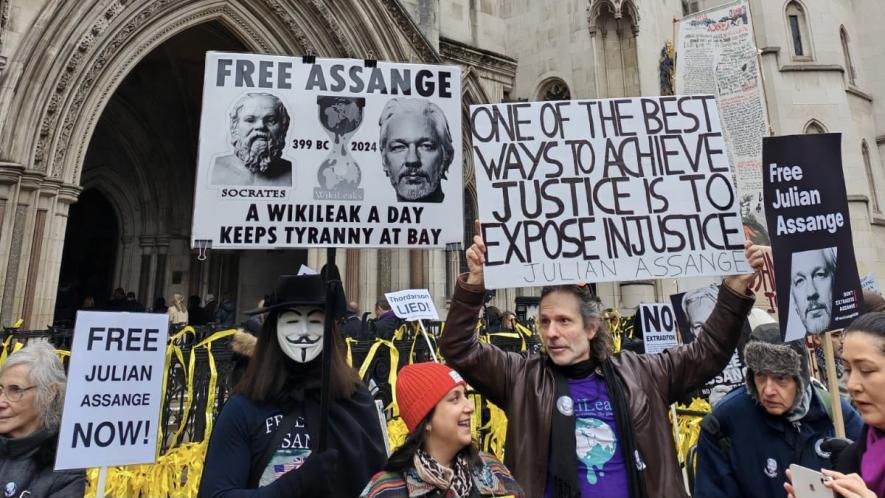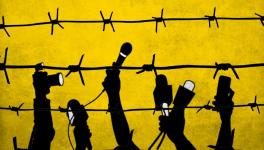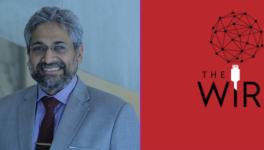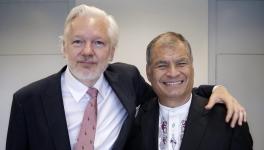Assange’s Last Stand

Supporters of Julian Assange rally outside the High Court on Day 1 of the hearing.
The two-day extradition hearing for imprisoned journalist and Wikileaks founder, Julian Assange, began on Tuesday, February 20. The hearing held by a two-judge bench at the High Court of Justice in London will decide whether Assange will receive one final chance to appeal against his looming extradition to the United States. The hearing could potentially be the last of such court hearings for Assange in the UK.
The defense team, led by Edward Fitzgerald and Mark Summers reiterated several grounds of appeal against the extradition including: the political nature of the offense cited for extradition, punishment without a crime, the violation of European Convention of Human Rights (ECHR), disproportionate penalty, and the unfair trial of a foreigner.
Assange was not present for the hearing on Tuesday, due to illness and was represented by his legal team. Assange’s defense team had stated during a media briefing that he suffered from a broken rib due excessive coughing coupled with his pre-existing osteoporosis.
The first day of the hearing was marked by a series of technical glitches which resulted in a two-hour delay from the scheduled start time. According to reporters, the court was not prepared to accommodate journalists covering the proceedings and many were sent to overflow rooms, where they were met with more challenges due to technical glitches in the live transmission of video and audio of the proceedings. While foreign journalists had been granted access to follow the proceedings via livestream for the majority of previous hearings, this time all those outside England and Wales were unable to connect.
The court went into recess until Wednesday, February 21, to be resumed for hearing the argument from the prosecution representing the US government.
Assange is a journalist, not a spy
Assange’s lawyer Edward Fitzgerald reiterated to the court the argument that both the offense that Assange is being charged with and the ongoing prosecution in the US are political in nature. He argued that espionage, which Assange is indicted for on 17 charges by federal prosecutors in the United States, is universally accepted as a political offense.
The US-UK Extradition Treaty and the UK Extradition Act prohibits extradition for political offenses, with the exception of terrorism and violence. In light of that, Fitzgerald argued that the exemption granted for political offenses is a universally accepted one and is present in virtually every bilateral extradition treaty that the UK has signed with dozens of countries.
Fitzgerald argued that espionage being an offense directed at the state, makes it a political offense by definition.
Mark Summers in his arguments for the defense built on Fitzgerald’s arguments that “Assange is being prosecuted ‘on account of’… his exposure of alleged US Government involvement in gross crimes of universal jurisdiction.”
Summers argued that contents of the disclosures made by Wikileaks between 2010 and 2011 constitute “the most important truthful revelations of hidden criminal state behavior” in US history and that the intention behind the prosecution was to punish and “prohibit” the exposure of the wrongdoings by the US government in Iraq and Afghanistan.
At the same time Summers brought attention to the fact that the district judge Vanessa Baraitser, and the High Court, had “failed entirely to acknowledge” this fact even though it was brought to their attention multiple times throughout the previous trials.
Summer then went on to submit the arguments for his “no punishment without law” ground for the appeal, stating that Assange was being prosecuted under legally unprecedented circumstances.
“The prosecution which ensued is legally unprecedented and was entirely unforeseeable as a matter of law,” Summers stated. “In 2010, publishing leaked US national security information was both legal and commonplace. Rendering it criminal, violates the core precepts of Article 7 ECHR [no punishment without law].”
Article 7 of the European Convention on Human Rights (ECHR) states that “only the law can define a crime and prescribe a penalty”.
Summers then went on to argue by citing examples that no prosecution was initiated against journalists even when leaked national security documents were published with names of individuals or when publication of unredacted names led to actual instances of violence or even in cases where stolen documents were published.
Assange’s prosecution under such charges as conspiracy to obtain state secrets or disclosure of state secrets was completely unprecedented in US legal history and is contrary to established legal practice at the time is beyond doubt, argued Summers.
The defense also labored on the point that Assange is a publisher of the documents and not the whistleblower. While whistleblowers are often prosecuted under certain circumstances, the conduct of publishers and journalists are specifically protected by ECHR provisions.
Loopholes in US case
The defense also pointed out several loopholes within the US government’s case both to the district judge and the UK government regarding Assange’s case.
Fitzgerald presented that the US government has argued that Assange will not be granted protection under the First Amendment of the US Constitution, which protects free speech and press freedoms among other rights.
“The evidence showed, in fact, that the US protections for free speech (the First Amendment) may not be available to Mr Assange at all. US prosecutor Mr. Kromberg has attested on oath that the US prosecution may argue at trial that ‘foreign nationals are not entitled to protections under the First Amendment,’” he stated.
The defense submission also pointed out that once extradited, nothing prevents the US from prosecuting Assange on charges not already stated at the time of the extradition. This was in specific reference to the Vault 7 leaks in 2017, that exposed US’ Central Intelligence Agency’s (CIA) extensive cybersurveillance activities and led to US deeming Wikileaks as a “non-state hostile intelligence service”.
The Vault 7 incident also reportedly led to the CIA formulating possible plans to either kidnap or assassinate Assange in the UK.
“There was an uncontroverted body of evidence before the DJ that, if Mr Assange were convicted after his extradition, he faces sentence (a) for conduct he has not been charged with, nor extradited for, potentially even conduct in respect of which he has been acquitted, (b) following a judicial fact-finding exercise on the balance of probabilities, (c) based upon evidence he will not see, and (d) which may or may not have been be legally obtained,” the defense argued.
Mass support for Assange
Hundreds gathered in a massive show of strength and support in a demonstration organized outside the Royal Courts of Justice, on Tuesday. The demonstration was organized by the Free Julian Assange Campaign and ran the full length of the hearing.
Assange’s wife Stella Assange, his father Gabriel Shipton, and Wikileaks editor-in-chief Kristin Hrafnsson spoke at the demonstration, along with various prominent activists and political leaders in the UK, like former Labor Party leader Jeremy Corbyn, Alexis Deswaef of International Federal of Human Rights (FIDH), John W. Rees of the Free Julian Assange Campaign, Sabrina Tucci of PEN International, Rebecca Vincent of Reporters Without Borders (RSF), and Len McCluskey of Unite the Union, among others.
While addressing the massive crowd gathered outside the courthouse, Stella Assange said in a rousing speech, “Whatever happens today and tomorrow and this week please keep on showing up. Be there for us and for you, until Julian is free. Free Julian Assange!” The demonstrators met her speech with chants of “Free Julian Assange!”
Emphasizing the uncertainty looming over her husband Stella added, “We don’t know what to expect. But you are here because the world is watching. They have to know they can’t get away with this. Julian needs his freedom and we all need the truth.”
Assange has remained imprisoned without charges since April 2019 in a high-security prison in Belmarsh on the outskirts of London, at the behest of the extradition request by the US.
His extradition was initially rejected by a district judge in London in January 2021 on grounds of Assange’s mental health and the risk of suicide and other bodily harm if he was extradited.
This decision was overturned by the High Court in London in December that year based on diplomatic assurances given by the US after the district court’s decision. In June 2022, the UK Home Office sanctioned the extradition based on the High Court’s decision.
Get the latest reports & analysis with people's perspective on Protests, movements & deep analytical videos, discussions of the current affairs in your Telegram app. Subscribe to NewsClick's Telegram channel & get Real-Time updates on stories, as they get published on our website.






















